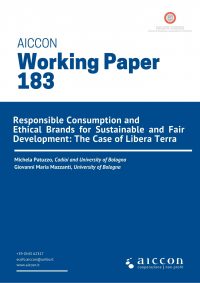183 – Responsible Consumption and Ethical Brands for Sustainable and Fair Development: The Case of Libera Terra
Abstract
The paper aims at analysing responsible consumption and ethical production phenomena, particularly focusing on the pioneer role of social enterprises in the change process of production patterns towards sustainable production. The Libera Terra case study will lead to an identification of best practices to outline strategic and operational guidelines for effective and sustainable ethical brand strategy design.
A theoretical analysis of responsible consumption and ethical production models, to reason on the nature of the phenomena and the reasons that led to their global spread. Major root causes, core values driving consumption and production patterns will be presented, focusing on the potential of social business models to foster sustainable development, thus offering a valid response to ethical consumers.
The Italian project Libera Terra will be examined as a model actor that was able to restructure local economies by promoting social farming on confiscated assets previously owned by mafias. Libera Terra has proved capable of developing a brand strategy that allows for long-term sustainability and competitiveness on the market.The case study lends support to the claim that for Libera Terra to be sustainable and competitive key success factors were: brand positioning strategy able to convey social mission by means of high-quality products; balance between perceived social values and perceived quality; consortia business model to acquire competitiveness and bargaining power and reinforce a unique and recognizable brand identity; promotion of emulation processes by other actors to generate broader impact.
Keywords: Ethical brand, Responsible consumption, Libera Terra, Social enterprise, Sustainable production, Confiscated assets

